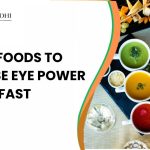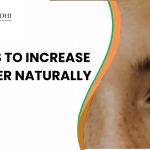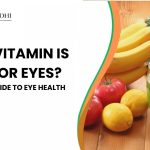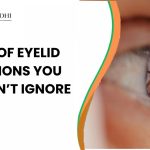|
Getting your Trinity Audio player ready...
|
Pause for a moment and truly appreciate the incredible gift of sight. From the vibrant colours of a sunrise to the intricate details of a loved one’s face, our eyes are our windows to the world, allowing us to connect, learn, and experience life to its fullest. It’s a sense we often take for granted until, perhaps, we notice a slight blur, a flicker of discomfort, or a change in how we perceive our surroundings.
While genetics, age, and certain medical conditions play a significant role in our eye health, did you know that your daily habits and lifestyle choices hold immense power? The good news is, you don’t need to perform extraordinary feats or search for magical remedies. Instead, you can empower yourself with simple, yet profoundly effective, natural ways to maintain good vision. Today, we’re going to explore five foundational pillars that can make a world of difference in safeguarding your eyesight, ensuring your eyes stay healthy, comfortable, and clear for years to come. At Indira Gandhi Eye Hospitals, we believe in a holistic approach to eye care, combining advanced medical expertise with practical advice to help you nurture your vision every single day.
The Power of Proactive Eye Care: Beyond Just Glasses
When we talk about maintaining good vision, many people immediately think of getting new glasses or contact lenses. While corrective lenses are undeniably vital for clear sight if you have a refractive error, true eye health goes much deeper. It’s about preserving the intricate structures of your eyes – the retina, optic nerve, lens, and cornea – from damage, disease, and the everyday stresses of modern life.
Our eyes are constantly working, from the moment we wake up to the instant we close them in sleep. They adapt to varying light conditions, focus on objects near and far, and process an astounding amount of visual information. This constant effort, combined with environmental factors, digital screen time, and systemic health conditions, can take a toll. This is where embracing natural ways to maintain good vision becomes not just a recommendation, but a necessity.
These “natural ways” aren’t about reversing significant damage or curing advanced eye diseases (which often require medical intervention). Instead, they are about providing your eyes with the optimal environment and resources to function at their best, reducing the risk of common issues, slowing the progression of age-related changes, and enhancing overall ocular well-being. Think of them as foundational habits that support and complement the professional eye care you receive. A holistic approach, integrating these practices into your daily routine, is your best bet for keeping your eyes healthy and vibrant.
1. Fueling Your Vision: The Nutritional Nurturing
Your eyes, like any other organ in your body, thrive on proper nutrition. The foods you eat can significantly impact the health of your retina, lens, and overall ocular function. A diet rich in specific vitamins, minerals, and antioxidants is one of the most powerful natural ways to maintain good vision.
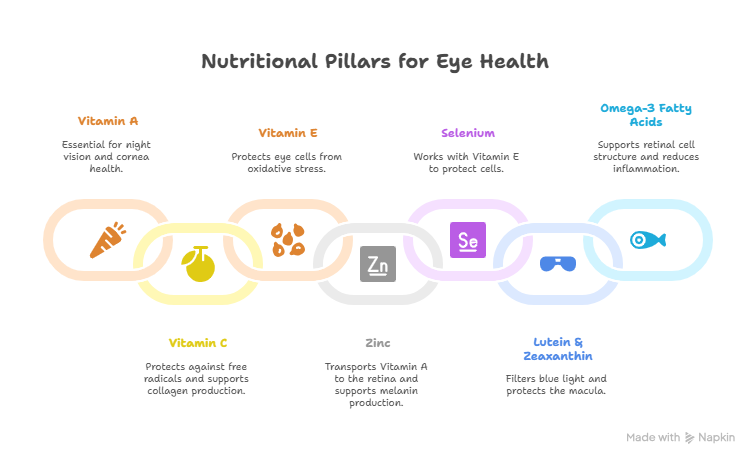
Key Nutrients for Eye Health and Their Sources:
- Vitamin A (and Beta-carotene):
- Role: Essential for good night vision and maintaining the health of the cornea (the clear front surface of the eye). Beta-carotene is a precursor that your body converts to Vitamin A.
- Sources: Carrots, sweet potatoes, spinach, kale, mangoes, apricots, dairy products, eggs. Think vibrant orange and dark leafy green vegetables!
- Role: Essential for good night vision and maintaining the health of the cornea (the clear front surface of the eye). Beta-carotene is a precursor that your body converts to Vitamin A.
- Vitamin C (Ascorbic Acid):
- Role: A powerful antioxidant that protects your eyes from damage by free radicals. It’s crucial for the production of collagen, a protein that provides structure to the cornea and the delicate blood vessels in the eyes. Studies suggest it may help reduce the risk of cataracts and slow the progression of age-related macular degeneration (AMD).
- Sources: Citrus fruits (oranges, grapefruits), berries (strawberries, blueberries), bell peppers (especially red and yellow), broccoli, and kiwis.
- Role: A powerful antioxidant that protects your eyes from damage by free radicals. It’s crucial for the production of collagen, a protein that provides structure to the cornea and the delicate blood vessels in the eyes. Studies suggest it may help reduce the risk of cataracts and slow the progression of age-related macular degeneration (AMD).
- Vitamin E:
- Role: Another potent antioxidant that protects eye cells from oxidative stress and damage caused by free radicals. It works synergistically with other antioxidants to safeguard eye tissues.
- Sources: Almonds, sunflower seeds, wheat germ oil, peanuts, spinach, avocado.
- Role: Another potent antioxidant that protects eye cells from oxidative stress and damage caused by free radicals. It works synergistically with other antioxidants to safeguard eye tissues.
- Zinc:
- Role: A vital mineral that helps bring Vitamin A from the liver to the retina, where it’s used to produce melanin, a protective pigment in the eyes. It’s also part of many enzymes critical for retinal health. Deficiency can lead to night blindness.
- Sources: Oysters (richest source), red meat, poultry, beans, nuts, fortified cereals.
- Role: A vital mineral that helps bring Vitamin A from the liver to the retina, where it’s used to produce melanin, a protective pigment in the eyes. It’s also part of many enzymes critical for retinal health. Deficiency can lead to night blindness.
- Selenium:
- Role: Works alongside Vitamin E and other antioxidants to protect cells from damage.
- Sources: Brazil nuts, seafood (tuna, cod), whole grains, eggs.
- Role: Works alongside Vitamin E and other antioxidants to protect cells from damage.
- Lutein and Zeaxanthin (“The Eye Vitamins”):
- Role: These are carotenoids that accumulate in the macula (the central part of the retina responsible for sharp, detailed vision). They act as natural sunglasses, filtering harmful high-energy blue light and protecting the macula from oxidative damage. Research strongly links them to reduced risk and slowed progression of AMD and cataracts.
- Sources: Abundantly found in dark leafy green vegetables like kale, spinach, collard greens, turnip greens, and also in corn, eggs, and broccoli.
- Role: These are carotenoids that accumulate in the macula (the central part of the retina responsible for sharp, detailed vision). They act as natural sunglasses, filtering harmful high-energy blue light and protecting the macula from oxidative damage. Research strongly links them to reduced risk and slowed progression of AMD and cataracts.
- Omega-3 Fatty Acids (DHA and EPA):
- Role: Crucial structural components of the retinal cell membranes. They are essential for proper retinal function and development. Omega-3s also possess anti-inflammatory properties, which can help reduce inflammation related to dry eye syndrome and other ocular conditions.
- Sources: Fatty fish (salmon, tuna, mackerel, sardines), flaxseeds, chia seeds, walnuts. Fish oil supplements can be considered, but whole food sources are always preferred.
- Role: Crucial structural components of the retinal cell membranes. They are essential for proper retinal function and development. Omega-3s also possess anti-inflammatory properties, which can help reduce inflammation related to dry eye syndrome and other ocular conditions.
Building a “Superfoods for Your Eyes” Plate: To implement these natural ways to maintain good vision through diet, aim for a colourful plate. Include a variety of leafy greens daily (spinach, kale), bright orange and yellow vegetables, berries, citrus fruits, nuts and seeds, and fatty fish a few times a week. This comprehensive nutrient intake will provide your eyes with the building blocks they need to thrive.
2. The Importance of Hydration: Quenching Your Eyes’ Thirst
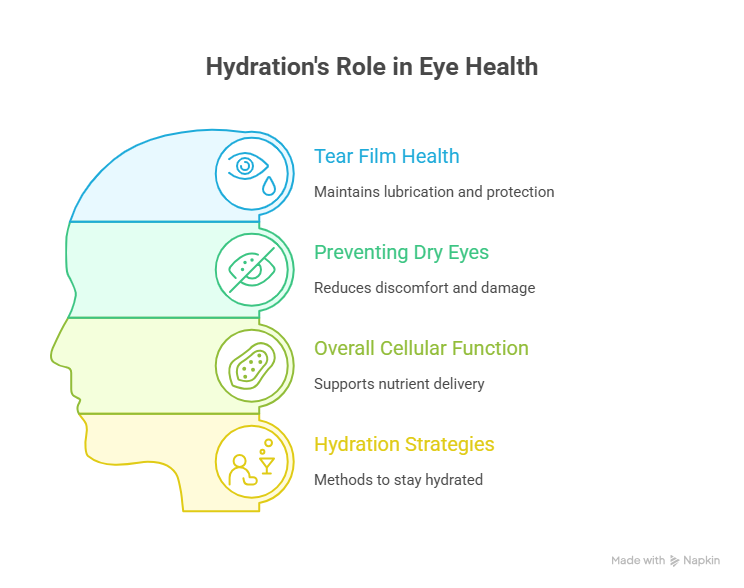
We often focus on hydration for our skin or energy levels, but its role in eye health is equally critical. Proper hydration is one of the often-overlooked natural ways to maintain good vision.
- Tear Film Health: Your eyes are constantly bathed in a protective tear film, which lubricates the surface, washes away debris, and provides oxygen and nutrients to the cornea. This tear film is primarily water. When you’re dehydrated, your body conserves water, and one of the first places to show the effects is often tear production.
- Preventing Dry Eyes: Insufficient tear production or poor tear quality leads to dry eye syndrome, a common condition characterized by symptoms like burning, stinging, redness, grittiness, blurred vision, and light sensitivity. Chronic dry eyes can lead to eye discomfort and even damage to the corneal surface over time.
- Overall Cellular Function: Every cell in your body, including those in your eyes, requires adequate water to function optimally. Proper hydration supports healthy circulation and nutrient delivery to all ocular tissues.
How to Stay Hydrated for Eye Health: Aim to drink plenty of water throughout the day. While individual needs vary, generally 8-10 glasses (around 2-3 litres) of water is a good target for most adults. Reduce intake of dehydrating beverages like excessive caffeine and alcohol. Be mindful of environmental factors like air conditioning, heating, and low humidity, which can increase tear evaporation and necessitate more water intake.
3. Giving Your Eyes a Break: Exercises and Habits for Digital Strain
In our increasingly digital world, eye strain has become a pervasive issue. Hours spent staring at screens (computers, phones, tablets) can lead to what’s known as Digital Eye Strain or Computer Vision Syndrome, with symptoms like blurry vision, dry eyes, headaches, and neck pain. Incorporating conscious breaks and simple exercises is are effective natural way to maintain good vision comfort and stamina.
- The 20-20-20 Rule: This is a golden rule for screen users. Every 20 minutes, look away from your screen at an object at least 20 feet away for at least 20 seconds. This simple act allows your eye muscles to relax from constant near-focus and can significantly reduce strain.
- Conscious Blinking: When we stare at screens, our blink rate dramatically decreases (by up to 50%!). Blinking is vital for replenishing the tear film, keeping the eyes lubricated, and washing away irritants. Make a conscious effort to blink fully and frequently while working on digital devices.
- Palming: A simple relaxation technique. Rub your hands together to create warmth, then gently cup your warm palms over your closed eyes, blocking out all light. Breathe deeply and relax for 1-2 minutes. The warmth and darkness help relax eye muscles and soothe tired eyes.
- Focusing Exercises: Periodically shift your focus between near and distant objects. Hold your finger about 6 inches from your nose, focus on it for a few seconds, then shift focus to something far away for a few seconds. Repeat several times. This helps improve your eyes’ ability to change focus.
- Ergonomics: Ensure your screen is about an arm’s length away, slightly below eye level. Adjust screen brightness to match your room’s lighting. Use anti-glare filters if needed. Good lighting (avoiding glare) in your workspace is also essential.
- Important Note: While these exercises and habits are excellent natural ways to maintain good vision comfort and reduce strain, they do not correct refractive errors like nearsightedness or farsightedness. They are preventative and symptomatic relief measures.
4. Shielding Your Eyes: Protection from Harmful Elements
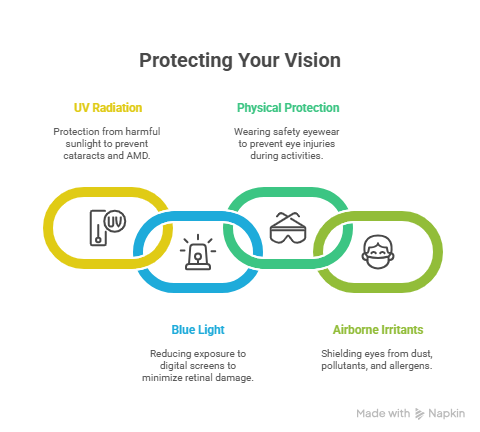
Our eyes are constantly exposed to environmental elements, some of which can cause significant damage over time. Protecting your eyes is a non-negotiable step among the natural ways to maintain good vision.
- UV Radiation (Sunlight): Prolonged exposure to ultraviolet (UVA and UVB) radiation from the sun is a major risk factor for several serious eye conditions, including cataracts (clouding of the lens) and age-related macular degeneration (AMD).
- Solution: Wear high-quality sunglasses that block 100% of both UVA and UVB rays, even on cloudy days. Look for labels that say “UV400” or “100% UV protection.” Wrap-around styles offer the best protection from peripheral light.
- Solution: Wear high-quality sunglasses that block 100% of both UVA and UVB rays, even on cloudy days. Look for labels that say “UV400” or “100% UV protection.” Wrap-around styles offer the best protection from peripheral light.
- Blue Light (Digital Devices): High-energy visible (HEV) blue light emitted from digital screens is a concern, as some research suggests it may contribute to retinal damage over time and disrupt sleep patterns.
- Solution: While the long-term effects are still being studied, reducing screen time, using the 20-20-20 rule, enabling “night mode” on devices (which reduces blue light), and considering blue-light filtering glasses (though their efficacy is debated) can be helpful.
- Solution: While the long-term effects are still being studied, reducing screen time, using the 20-20-20 rule, enabling “night mode” on devices (which reduces blue light), and considering blue-light filtering glasses (though their efficacy is debated) can be helpful.
- Physical Protection (Safety Eyewear): Eye injuries are a common cause of preventable vision loss.
- Solution: Always wear appropriate safety glasses or goggles when engaging in activities that pose a risk to your eyes, such as gardening, DIY projects, using power tools, playing sports (especially racquet sports), or working with chemicals.
- Solution: Always wear appropriate safety glasses or goggles when engaging in activities that pose a risk to your eyes, such as gardening, DIY projects, using power tools, playing sports (especially racquet sports), or working with chemicals.
- Dust, Pollutants, and Allergens: Airborne irritants can cause significant discomfort, redness, and inflammation.
- Solution: Wear protective eyewear (even regular glasses or sunglasses) in dusty or windy environments. Keep windows closed during high pollen counts, and use air purifiers if necessary.
5. The Restorative Power of Sleep: A Nightly Eye Spa
Good quality sleep is fundamental for overall health, and your eyes are no exception. Adequate rest is one of the simplest yet profound natural ways to maintain good vision.
- Eye Recovery and Repair: During sleep, your eyes get a much-needed break from focusing and light exposure. This is when essential repair processes occur. The eyes get replenished with vital nutrients and tears, and muscle fatigue from a day of constant focusing can resolve.
- Reduced Eye Strain and Dryness: Lack of sleep often manifests as tired, red, itchy, or dry eyes, sometimes accompanied by twitching eyelids or blurry vision. These symptoms arise because insufficient sleep means the tear film isn’t adequately replenished, and eye muscles don’t get sufficient time to recover.
- Overall Health Impact: Sleep deprivation can disrupt hormone levels, impair immune function, and contribute to systemic inflammation, all of which can indirectly impact eye health. For individuals with conditions like diabetes or glaucoma, consistent good sleep supports overall disease management.
Tips for Quality Sleep: Aim for 7-9 hours of uninterrupted sleep per night. Establish a consistent sleep schedule, create a dark, quiet, and cool sleep environment, and avoid screens for at least an hour before bedtime. Prioritizing sleep is a powerful yet often underestimated component of natural ways to maintain good vision.
Beyond Natural: The Indispensable Role of Professional Eye Care
While embracing these five natural ways to maintain good vision is incredibly powerful and highly recommended, it’s crucial to understand that they are complementary, not substitutes, for professional eye care.
Many serious eye conditions, such as glaucoma, diabetic retinopathy, and early stages of macular degeneration, can progress silently without noticeable symptoms until significant and irreversible vision loss has occurred. Regular comprehensive dilated eye exams by a qualified ophthalmologist are the only way to detect these conditions early. Early detection allows for timely medical interventions that can preserve your vision, even if natural methods aren’t enough on their own.
Your eye doctor can identify potential risks, monitor existing conditions, and provide specific treatments or advice tailored to your unique eye health needs. Think of your healthy habits as your daily defense, and your eye doctor as your expert strategist and backup.
Your Vision, Our Priority: Expert Care at Indira Gandhi Eye Hospitals
Your vision is a lifelong asset, deserving of consistent care and attention. By integrating these five natural ways to maintain good vision into your daily life – nourishing your body with eye-healthy foods, staying well-hydrated, giving your eyes regular breaks from digital strain, diligently protecting them from environmental harm, and ensuring you get adequate restorative sleep – you are taking powerful proactive steps towards lifelong eye health.
At Indira Gandhi Eye Hospitals, we are committed to providing comprehensive eye care that merges advanced medical science with a deep understanding of holistic well-being. Our team of expert ophthalmologists utilizes state-of-the-art diagnostic and treatment technologies to address a full spectrum of eye conditions, from routine check-ups to complex surgical procedures. We encourage you to embrace these natural ways to maintain good vision and combine them with regular professional eye examinations. We are here to partner with you, ensuring your eyes receive the finest care possible to keep your world clear and vibrant.
For a comprehensive eye examination, personalized advice on safeguarding your vision, or to explore any specific eye health concerns, we invite you to connect with us. Visit our website at https://indiragandhiehospital.com/ to learn more and schedule your appointment. Let Indira Gandhi Eye Hospitals be your steadfast ally in preserving your precious eyesight.
Frequently Asked Questions (FAQs)
Can lifestyle changes truly prevent the need for glasses or eye surgery?
While a healthy lifestyle can promote overall eye health and potentially slow the progression of certain age-related conditions, it generally cannot correct pre-existing refractive errors like nearsightedness or farsightedness, nor can it eliminate the need for surgery for advanced conditions like cataracts or glaucoma. These natural ways to maintain good vision act as powerful supportive measures.
Are eye exercises effective for improving vision or just for eye strain?
Eye exercises are highly effective for relieving eye strain, improving eye comfort, and enhancing eye muscle flexibility and coordination, especially for those who spend a lot of time on digital screens. However, they are not proven to correct refractive errors or significantly improve visual acuity in conditions like nearsightedness.
How important is diet in maintaining good vision, and what specific nutrients are key?
Diet is extremely important, as specific nutrients directly support eye health. Key nutrients include Vitamin A (for night vision and cornea), Vitamin C and E (powerful antioxidants), Zinc (aids Vitamin A transport), and especially Lutein and Zeaxanthin (which filter harmful blue light and protect the macula).
Should I take eye vitamin supplements, or are food sources enough for maintaining good vision?
For most people with a balanced diet, consuming eye-healthy nutrients from whole food sources like leafy greens, colorful fruits, nuts, and fatty fish is generally sufficient for maintaining good vision. Supplements might be recommended by an eye doctor for specific conditions like age-related macular degeneration or if dietary intake is insufficient.
Is blue light from screens harmful, and what are natural ways to protect against it?
While the extent of long-term harm from digital blue light is still researched, it can contribute to digital eye strain and potentially affect sleep patterns. Natural protection includes following the 20-20-20 rule, adjusting screen settings (night mode), increasing conscious blinking, and prioritizing screen-free time before bed.
Does getting enough sleep truly impact my eye health?
Yes, adequate sleep is vital for eye health. During sleep, your eyes get essential rest, allowing for repair and replenishment of the tear film, reducing dryness and irritation. Chronic sleep deprivation can lead to symptoms like eye twitching, redness, and increased eye strain.




